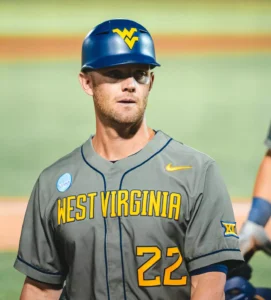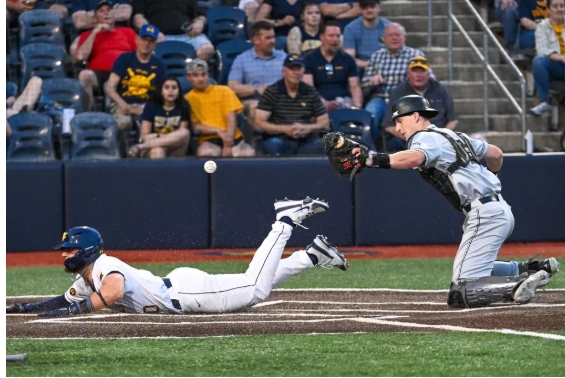The week’s new national top 25 came out, and once again, West Virginia’s not in the top 15 of the rankings despite an overall winning percentage near .900. The Mountaineers have a pretty gaudy record, with fewer losses than anyone else in the nation. They’re also leading the Big 12, widely considered the third-best conference in baseball behind the SEC and ACC.
Yet they’re only ranked 17th.
Read More: Building Respect: Future Steps for West Virginia Baseball
And they’re not the only ones in the Big 12 not feeling the love. With TCU losing its series to UCF and falling out of the rankings, Arizona is the league’s only other ranked school. Meanwhile, the SEC has 10 ranked teams and the ACC has six. The Big 12 doesn’t even have the third-highest amount of ranked teams; that honor goes to the Sun Belt with Troy, Coastal Carolina and Southern Miss.
The league just isn’t getting as much respect as it once did. That means West Virginia’s got to change a few things moving forward now that Steve Sabins has proven the program is stable. Mainly, the Mountaineers have to make an attempt to change up their scheduling. Here are a few things West Virginia has to try to do moving forward.
Schedule an SEC or ACC Series (Besides Pitt)

Look at the top 20 in the nation, and you’ll see something striking: Thirteen of the 20 schools on that list play in either the SEC or the ACC. Besides the Mountaineers, the entire list of top 20 schools not in those two conferences are Arizona, Oregon, Oregon State, UC Irvine, UCLA and Troy. That means the SEC and ACC schools almost never have the opportunity to drop, because they’re just taking losses to each other when they do lose.
West Virginia can change that narrative by playing and winning a series with any of these schools. And the Mountaineers’ geographic situation enables them to do exactly that. There are plenty of good baseball schools within a few hundred miles that West Virginia could play a three-game set against.
Related: How the WVU Gymnastics Team Turned Its Season Around
When considering future steps and building respect, Virginia Tech immediately jumps out as an almost ideal scheduling partner. The Hokies have spent time in the rankings, they’re 250 miles from Morgantown and they were one win from the College World Series in 2022. They’re also still somewhat of a rival with older fans.
Beyond the Hokies, the Mountaineers could try to schedule Virginia, North Carolina, Duke, Wake Forest, N.C. State, Kentucky or Tennessee. All are excellent programs that would help the Mountaineers build their strength of schedule and figure out where their flaws are in March or April.
Schedule Stronger Local Rivals
Playing Pitt regularly is a good thing. The Panthers are the rivalry WVU cares most about, as evidenced by the record-breaking crowd to watch the Mountaineers smash their Backyard Brawl rivals. Ideally, the teams should play three times a year, once in each team’s home park and once at PNC Park. Facing Penn State is also a good way to interest fans.
But that said, wow, could the Mountaineers use more from their rivals.
Pitt hasn’t made the NCAA tournament since 1995. It’s easily the poorest job in the ACC because of going 30 years without a tournament appearance, in a league that regularly sends eight teams or more to the field. Penn State hasn’t made it since 2000. That’s not great for getting ready for the NCAA tournament.
Related: West Virginia vs. Penn State Preview
There are stronger rivals out there that the Mountaineers should call. Maryland is slumping this year, but the Terrapins made three straight NCAA tournaments before losing coach Rob Vaughn to Alabama. Virginia Tech, as mentioned before, makes a good local rival.
Kentucky isn’t a rival, but there’s an idea there regarding building respect and future steps: Play the Wildcats in Charleston. GoMart Ballpark remains a quality minor league facility, and it’s around 155 miles from Morgantown and 175 miles away from Lexington. Scheduling two games in Charleston one week gives both teams a quality opponent at a neutral site. It’s a sensible way to add to the schedule if both teams are game.
Building Respect: Future Steps Should Use the Big 12’s Geography

The Big 12’s not as big of an offender as the Big Ten or ACC, but the league’s geography still makes little sense. A conference is not supposed to stretch from Orlando to Phoenix. But as long as it does, the Mountaineers can use the league’s layout to their advantage.
When West Virginia goes out to play a school like Arizona or Arizona State, the Mountaineers can use their time out there to pick up an extra game with a school they wouldn’t normally see. Arizona State is using this perfectly this year. The Sun Devils recently came out to Cincinnati for a three-game set.
On their way home from Ohio, they stopped in Indiana to play Purdue. That gave the Sun Devils a chance to see some fresh faces and test themselves against a school from another power conference.
West Virginia can do the same. Once you’re in Phoenix, it’s not a big ask to travel to Los Angeles and play UCLA or USC. The Mountaineers could go from a weekend series at TCU to a Monday or Tuesday game at Dallas Baptist. They could pick up Texas A&M in College Station on their way home from playing Houston, or face Florida or Florida State after playing UCF. The possibilities are endless.
The Big 12’s geography is weird, but that creates opportunity. And the Mountaineers need to figure out how to take advantage of it and make it work for them.
Set a Clear Goal and Schedule With It In Mind
The fact that we can have these conversations about future steps and building respect is a testament to Sabins’ work this season. This year was more about making sure that West Virginia has a steady hand in place after Randy Mazey’s retirement. You only need to look at how poorly Florida State handled the retirement of Mike Martin Sr. and failed transition to Mike Martin Jr. to know how easy it is to screw that up.
The Seminoles rebounded quickly under Link Jarrett, but their program is established enough to withstand a mistake like that and stay sturdy. West Virginia is not there yet, which is why Sabins had to get this year right.
But now that he has, it’s time to think about the next step: getting the NCAA tournament to regularly come through Morgantown. By that, I don’t mean getting the Mountaineers to just make the field. That’s the new baseline for success now that Sabins has established that West Virginia is still going to be a solid Big 12 program.
I mean getting West Virginia to a top 16 seed and hosting a regional on a regular basis. And that starts with scheduling tough, because the Mountaineers aren’t going to get top-16 respect by just winning inside the Big 12.
Like it or not, the SEC and ACC control the narrative until someone like West Virginia goes in and knocks them off their perch. And the best way to do that is to get those teams on the schedule.

